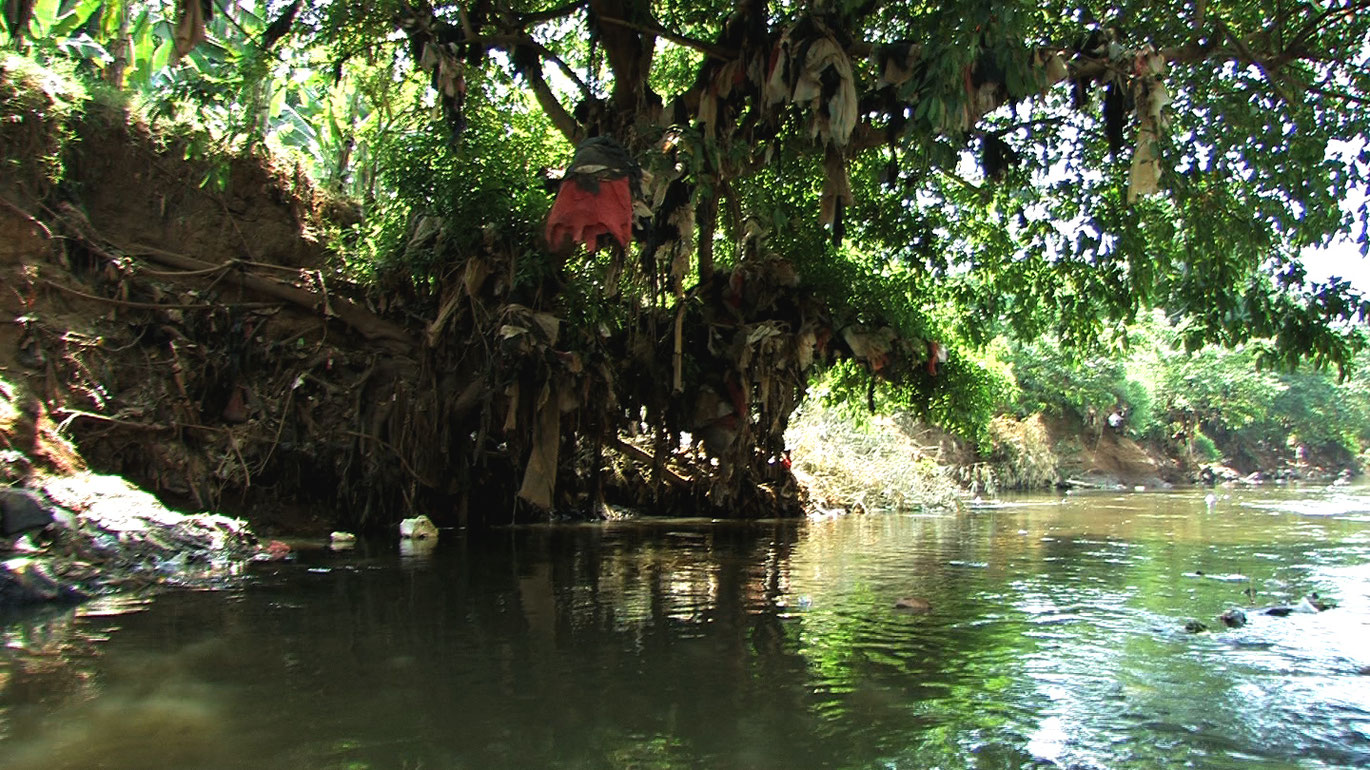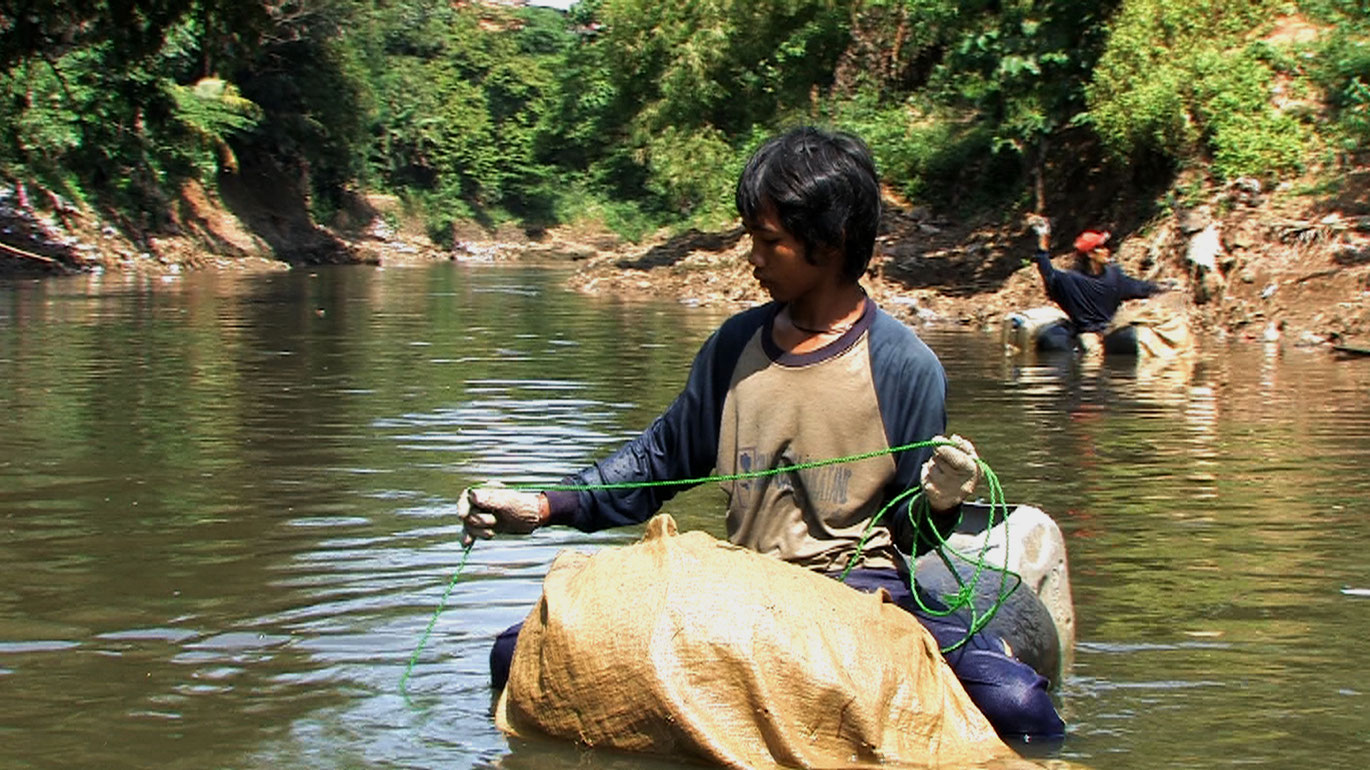Paradise Later
We grab what we can get for the sake of what is to be got. It is just robbery with violence, aggravated murder on a great scale, and we going at it blind, as is very proper for those who tackle a darkness - reckless without hardihood, greedy without audacity, and cruel without courage. (film quotation)
Blinking. As if eyes had to adjust to the light, the images appear in the glaring white and then disappea – withdrawing from our curious, greedy gaze. While a traveling salesman reports to his company´s managing board off camera and the man´s doubts and complaints become more obvious, the camera follows the course of a lazy river on the edge of a large tropical city. "The conquest of the earth is not a pretty thing when you look into it too much." The riverbanks are covered with piles of garbage where goats graze, trash hangs from the trees like tinsel, and fast-food wrappers float on the water´s surface. Fishermen cast out their nets like clockwork in the hope of catching something they can eat or use, and children play in the muddy water in front of rundown shacks. The atmosphere, made unreal by the soundtrack, is occasionally punctuated, as if the surroundings´ "real" sounds and voices were trying to hold their own against the omnipotent voice.
Of all the world´s emerging markets, Indonesia, with a population in the millions, represents the best opportunity for unbridled international capitalism. In the global competition for new factory locations and markets, colonialistic corporations are ignoring social and ecological standards. The outer and intermediate zones of exploding, Moloch-like megacities are home to more and more people living in profound poverty, who subsist on the refuse of an expanding consumer society. The documentary images captured by cameraman Victor Jaschke are not consistent with the familiar advertisements featuring palm-lined beaches. The text used for the narration is a distillation of Josef Conrad´s 1899 Heart of Darkness, which Breuer transposes from late 19th century Belgian Congo to 21st century Indonesia. Conrad´s novel is relevant, both as political commentary and also because of its monolithically logocentric air, which seems to arrogantly place itself above the images of poverty and suffering.
Paradise Later develops a disturbing draw that, through the juxtaposition of the literary text and the unhurried, deliberate images of misery, produces an unconventional and ambivalent critique of globalization: Apocalypse now – paradise later!
(Gerald Weber)
Paradise Later is a "documentary adaption of a novel". Inside the head of a trader we travel on a river meandering through an apocalyptic scenery. A stream of thoughts carries us away into a vortex of accusation, damnation and self-condemnation. We take a short exit – into a reality. The gaze widens for a moment. But our captain frantically navigates us towards a fatal ending.
(production note)
Unirdische (Traum-)Welt - von Ute Mörtl (Article)
Paradise Later - eine Fimrezension
Wer sich den Kurzfilm Paradise Later anschaut, braucht eine Denkpause. Die Botschaften bohren sich wie ein Schraubstock in die Gedankenwelt. Sie wollen nicht an den elendigen Drehort, und trotzdem sind Sie neugierig? Dann steigen Sie ein in das Boot! Vom Wasser aus ist das Schicksal der Müllmenschen ohnehin nicht so nah.
Der Erzähler, ein Handelsdelegierter, heißt Sie als geehrte Mitglieder der Gesellschaft an Bord willkommen. Die Mitreisenden geraten in den Strudel des Gedankenstromes eines Gefangenen des Wirtschaftssystems. Was wird er dem Vorstand seines Unternehmens berichten, wenn er aus diesem Nichts zurück kehrt?
Die apokalyptische Landschaft befindet sich am Rande einer Metropole in den Tropen Indonesiens. Von den Bäumen hängt Unrat wie Lametta herab und Verpackungen treiben auf dem trüben Wasser. Fischer werfen ihre Netze nach Verwertbarem oder Essbarem aus. In den Rand- und Zwischenzonen der indonesischen Metropolen leben immer mehr Menschen in größter Armut von den Abfällen der Konsumgesellschaft.
Der logozentrische Blick des Erzählers, der alles versteht und einordnet, ohne einen offenen Dialog zuzulassen, legt sich als spürbare Arroganz über die Aufnahmen. Die durch den Soundtrack unwirklich anmutende Atmosphäre bricht kurz auf, als versuchten sich die realen Geräusche und Stimmen der Umgebung gegen die Allmacht der Stimme zu wehren. So sehen die Mitreisenden erstmals die Menschen, die auf diesem kargen Landstrich leben.
Regisseur Ascan Breuer stellt Textpassagen von Joseph Conrads Roman Herz der Finsternis in einen Zusammenhang mit dokumentarischen Bildern. Breuer nutzt den über 100 Jahre alten Text von Joseph Conrad mit einigen Abänderungen als zeitgenössischen Kommentar.
Der Film fokussiert auf die verlogene Einstellung, mit der sich der Handelsreisende lange Zeit über die tristen, wuchtigen Eindrücke hinweg tröstete. Er gibt zu, dass er bis zu dieser Bootsfahrt dachte: Wenn ich dem Vorstand zeige, dass in mir was steckt, aus dem man Profit machen kann, würde die Hochachtung grenzenlos sein.
Doch plötzlich wacht er auf und erkennt, dass die Vergötterung von Effizienz nicht das ist, was die Welt rettet. Der wohl durch das bisherige Wegsehen ausgelöste Phantomschmerz geht als monströses, freies Etwas mit ihm um. Seine Anklage spitzt sich dementsprechend zu: Wir saugen das Land aus. Wir sind Eroberer und dafür reicht rohe Gewalt. Unsere Stärke ist nur ein glücklicher Zufall, der sich aus der Schwäche anderer ergibt. Wir handeln blindlings, was typisch ist für all jene, die im Dunkeln tappen. Rücksichtslos aber nicht kühl, gierig aber nicht verwegen und grausam aber nicht mutig, bar jeder Voraussicht, kein wenig ernsthafte Absicht. Einzig dem Land die Schätze zu entreißen, das wollen wir.
Es ist kein Traum, in den sich die/der ZuseherIn begibt, sondern Apathie, die sich über den Schmerz des Erzählers legt. Dieser müde Blick lindert zwar die Angst des Handelsreisenden. Aber der Hunger, der wie der Handelsreisende beobachtet - den Müllmenschen jegliche irdische Grundzüge und Skrupel nimmt, bleibt bestehen. Was ist mit den Skrupeln der mitreisenden KonsumentInnen und Wirtschaftstreibenden? Haben sie ihre Skrupel verloren? Sitzen wir bereits alle in einem Boot?
Ute Mörtl
Next Generation (Critique)
FILMDIENST (10.06.10, 12/2010, S.13)
Next Generation / FILMDIENST (engl) (Critique)
FILMDIENST (10.06.10, 12/2010)
Vom Eindringen und Ausschlachten (DIAGONALE-Festivalzeitung) (Critique)
Drei prägnante Beispiele für österreichisches Dokumentarfilmschaffen in Kurzform
"...Auf ganz andere Weise erschreckend zeigt Paradise Later von Ascan Breuer die Folgen der Globalisierung. Eine namenlose Stimme berichtet der Vorstandsetage eines Konzerns von ihren Eindrücken in einem Billiglohnland. Die Kamera fährt gemächlich einen Fluss entlang. Man erkennt, dass die seltsamen Gebilde, die Lametta-ähnlich von den Bäumen hängen, Müll sind. Immer weiter dringt die Reise ins 'Herz der Finsternis' vor, der Text ist ein Destillat aus Joseph Conrads gleichnamigem Roman, der vor über hundert Jahren geschrieben wurde, aber auch heute noch erstaunlich aktuell wirkt. Die Stimme beginnt an der Richtigkeit des Eroberungskrieges gegen die Dritte Welt, der diesmal mehr mit den Waffen des Kapitalismus geführt wird, zu zweifeln. Menschen tauchen auf und suchen in den Müllbergen nach Dingen zum Ausschlachten. Wie weit auch die kulturelle Globalisierung fortgeschritten ist, erkennt man am T-Shirt eines kleinen (...) Jungen, der in die Kamera lacht: Es ist von der Band 'The Exploited' und trägt die Aufschrift 'Punks not dead'. Das schaut verdächtig nach Inszenierung aus, ist aber wohl eher einer dieser Zufälle, die DokumentarfilmerInnen die Arbeit erleichtern, weil sie Inhalte in einem einzigen Bild verdichten."
(aus: DIAGONALE-Festivalzeitung, 03/2010, S.40f)
About Invasion and Exploitation DIAGONALE-Festival Gazette (Critique)
Three concise examples of Austrian documentary cinema art in short
"... Terrifying in a completely different manner Paradise Later by Ascan Breuer shows the outcome of globalization. A nameless voice reports to the executive board of a corporate trust about its impressions in a low-wage country. The camera gently tracks along a river. You recognize that the bizarre formations hanging down the trees like lametta are in fact garbage. More and more the journey penetrates into the 'Heart of Darkness' - the text is a destillate of Joseph Conrads novel of the same title, that was written more than hundred years ago but still appears to be amazingly up to date. The voice starts to question the war of conquest against the Third World, which this time is waged with the weapons of capitalism. Human beings emerge, looking for things in the piles of rubbish worthy to exploit. The advancement of cultural globalization is represented by the T-shirt of a little (...) boy who smiles towards the camera: It's of the band 'The Expoited' having the inscription 'Punk's not dead' on it. That looks suspiciously posed but is probably more one of these happenstances that facilitates the work of documentary filmmakers, because they condense the contents into one image only."
(taken from: DIAGONALE-Festival Gazette, 03/2010, p. 40f)
Unearthly (Dream-)World by Ute Mörtl (Critique)
Muck is hanging down from the trees like lametta and packagings are floating in the muddy water. Fishermen are casting their fishnets to find something usable or eatable.The logocentric view of the narrator comprehending and classifying everything without admitting any dialogue superimposes the takes with noticeable arrogance. The atmosphere - appearing unreal because of the soundtrack - is briefly disrupted, as if the 'real' sounds and voices of the environment were trying to fight back against the omnipotence of the voice-over. Now for the first time the fellow travelers see the humans who live on this barren clime.
The filmmaker Ascan Breuer contextualizes passages of Joseph Conrad's novel 'Heart of Darkness' with documentary pictures. Breuer uses this more than 100 year old text with some modifications as a contemporary comment. The film focuses on the untruthful attitude with which the trade manager consoles himself for a long time to get over the massive impressions. But suddenly he awakes and recognizes that the 'Devotion to Efficiency' is not what saves the world. The phantom pain probably triggered by his previous ignorance is haunting him like a "thing monstrous and free". It's not a dream in which the spectator plunks, but apathy which overlays the narrator's grief. What about the scruples of the consumers and traders on board? Did they lose their scruples? Are we all in the same boat already?
(published in MALMOE, 48/2009, www.malmoe.org)
Eye for Film magazine review (Critique)
It's visually striking, haunting, compelling, classed as a 'video essay' because, well, who keeps track? Ascan Breuer's film is impressive, beautifully synthesising documentary footage and the cornerstone of Congolese colonial comparisons. Bound up in it is commerce, industrialisation, callous disregard for man, environment, and on.
At some 13 minutes it lacks the awe-inspiring weight of Apocalypse Now Redux, but is no less strong for coasting on excerpts, snippets, representative samples. Sometimes the sense of a thing is enough, and Paradise Later delivers ably. Talk of boards and society members fits now, and what it has to say about what has changed and has not changed is worthwhile, if bleak.
By Andrew Robertson, Eye for Film magazine, UK, Oct. 2010, www.eyeforfilm.co.uk
Eye for Film-Magazin Kritik (Critique)
Visuell eindrucksvoll, bewegend, unwiderstehlich, klassifiziert als 'Video-Essay', weil, nun, wer behält da den Überblick? Ascan Breuers Film beeindruckt, indem er dokumentarisches Material mit dem Meilenstein der kongolesischen Kolonial-Gleichnisse wunderbar miteinander kombiniert. Damit verknüpft sind Kommerz, Industrialisierung, herzlose Menschenverachtung, Umwelt, und so weiter.
In den 13 Minuten lässt er die Ehrfurcht gebietende Gewichtigkeit von Apokalypse Now Redux vermissen, aber er surft nicht weniger kraftvoll über Zitate, Schnippsel, repräsentativen Stichproben. Manchmal genügt sich der Sinn einer Sache selbst, und Paradise Later liefert ihn gekonnt. Was er zu sagen hat über das, was sich geändert und nicht geändert hat, ist lohnenswert, wenn auch düster."
Von Andrew Robertson, Eye for Film-Magazin, UK, Okt. 2010, www.eyeforfilm.co.uk
Paradise Later
2010
Austria, Germany, Indonesia
13 min 20 sec
Essay, Short film
English
german version, french


